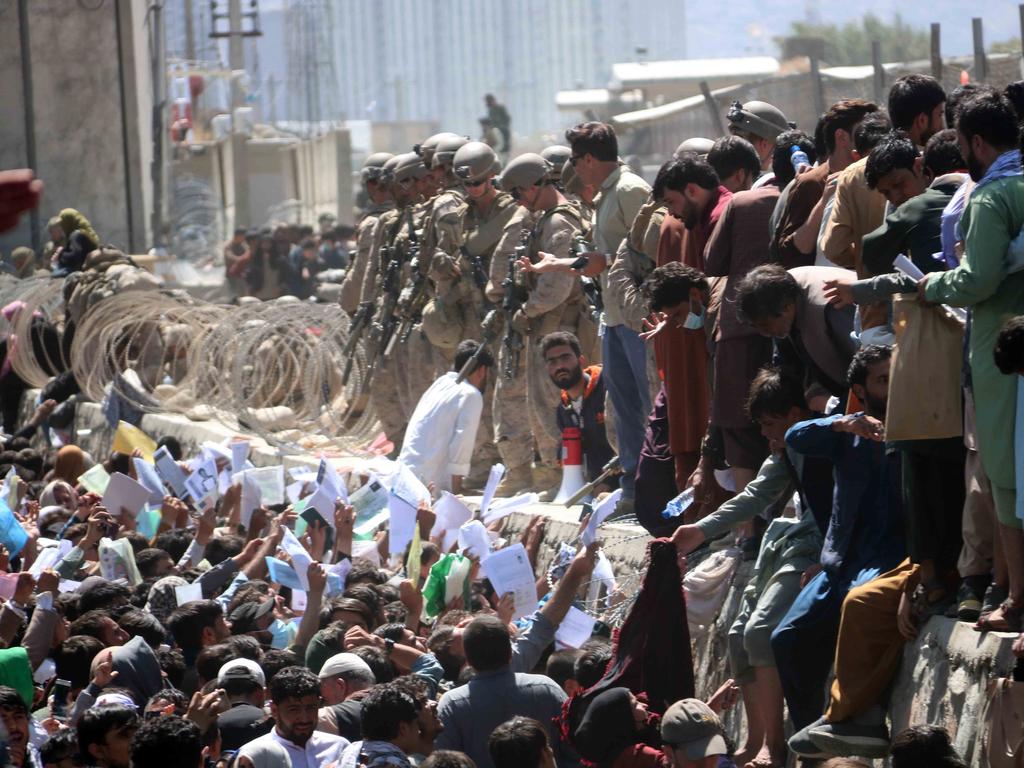Even lipstick a threat, say women as Taliban close beauty parlours
Even lipstick’s a threat, say distraught women of Afghanistan struggling to comprehend the shutdown of their livelihoods and, for many, one of their last refuges.

Aqeela Azimi and her staff were doing a bride’s hair and make-up at the Max Beauty salon in Kabul. They bustled around with brushes and tongs, chatting and laughing. Then a phone pinged with news that left them distraught: the Taliban had ordered the closure of all Afghanistan’s beauty salons.
“First I didn’t believe it,” said Azimi. “We all began checking social media. Then when we realised it was real, we all started crying.”
Beauty salons were one of the last refuges for Afghan women who are barred from most work as well as public baths, gyms and parks. But now the Ministry for Promotion of Virtue and Prevention of Vice has declared them un-Islamic.
A video posted on Twitter last week by its spokesman, Mohammad Sadiq Akif, emphasised eyebrow shaping and hair extensions as being “forbidden by Sharia law” and warned that bridal makeovers were leaving grooms in debt.
“It seems like the Taliban just want to wipe women out,” said Azimi, 27. “There is nothing left for us. Even lipstick is a threat.”

Since taking power almost two years ago, the hardline Taliban militants have imposed so many restrictions on women and girls that many describe it as gender apartheid. Girls are banned from high school and university. Women are prohibited from travelling without a male escort, and working almost anywhere except hospitals and girls’ primary schools.
In December, the Taliban banned them from working for aid agencies even though, for cultural reasons, only women are able to distribute food to women. This was followed in April with a ban on women working for United Nations organisations.
“The ban on beauty salons seems like the last door closing,” said Zahra Joya, founder of Rukhshana media, an online news agency focusing on women. “Every day I wake up to messages of women committing suicide.”
For two hours after getting the order to close, Azimi and her staff did nothing but weep. Eventually the distraught bride, whose eye make-up had run with her tears, persuaded them to finish the job so she would not be late for her wedding. Then Azimi pulled down the shutters.
She and her eight workers will struggle to feed their families. Her husband, a former interpreter for the US, is in hiding, leaving her as sole provider for their children and extended family.

With Afghanistan in the grip of what the UN says is the world’s biggest humanitarian crisis – 28 million people needing assistance – there are few options.
“I am worried beauty workers will be forced into prostitution,” Azimi said. “It’s the only way left.”
Just a few weeks ago, the Taliban had suddenly come to the salon, demanding she pay registration and tax for the year ahead. “They took the tax then closed us down.”
Beauty salons are not only the last remaining means of income for women in Afghanistan but also the only place they could gather.
“It was the last haven for women, the only place women could come and be happy,” said Azimi. “We had former headmistresses, scientists, policewomen, so many educated people just asking for a seat, saying I just want somewhere for myself.”
Opening her salon in Kabul six years ago had been the happiest day of her life. “My salon was my life, my biggest achievement,” she said. “I started working in salons at 12 and people called us bad names, because of their traditional mindset, so I fought very hard to make this business.”
It soon became popular, employing 13 staff, and at weekends and in wedding season would serve as many as 40 customers in a day, including two or three brides.
They closed when the Taliban took over in August 2021. But then were told they could reopen as long as they removed all pictures of women. In some cases, the Taliban had already scrubbed out faces in the pictures.

With the flight overseas of so many of her middle-class customers combining with an economic crisis, customer numbers halved and Azimi reduced her staff to eight.
In her best months in the summer she was making up to 60,000 afghanis a month (about $1010), though in winter it sometimes dropped to just $153. She had followed all the rules, she said. Earlier this year they were told they must wear a hijab so only their faces were showing.
The closure came with no warning. The ministry for promotion of virtue and prevention of vice ran video interviews with women apparently supporting the ban. “Women come out of those salons looking like monkeys,” said one.
“That’s ridiculous,” protests Azimi. “Even wives of Taliban came for haircuts or make-up.”
According to Afghanistan’s chamber of commerce and investment, there are about 12,000 beauty salons operating across the country of which some 3000 are in Kabul.
Some owners bravely took to the streets to protest on Wednesday but were quickly dispersed by Taliban.
Azimi says she has no idea what to do. A few of her competitors are planning to open clandestine salons like the underground schools for girls, but she worries it is too risky.
“What if one of our customers tells the Taliban?”
Others say their only option is to pay smugglers and try to get to Britain or elsewhere in Europe.
The Times






To join the conversation, please log in. Don't have an account? Register
Join the conversation, you are commenting as Logout